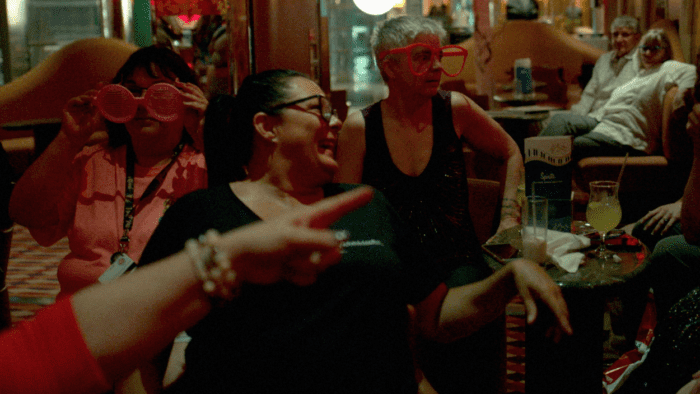It wasn’t bound to be long until Chloe Zhao’s Nomadland would ultimately find itself a follow-up act. On October 5, 2023, Peter Eavis of the New York Times published an extensive profile on women being unable to fill truck driver jobs as a result of trucking company Stevens Transport’s same-sex training policy, in which women were unable to be employed by the company because they had no women to train them. The article itself was an open, detailed discussion on concerns about sexual harassment in the trucking industry, bringing with it the evident realization that companies were putting an exclusionary, sexist bandage on a problem they were unwilling to solve systematically through altering their policies and programs.
Eavis interviewed various female truckers all throughout the country for this particular piece on their experiences and viewpoints on the matter. Among them was Desiree Wood, who is the central figure of Nesa Azimi’s debut feature documentary, Driver—a quietly itinerant counterpart to Eavis’s New York Times piece, dedicating itself more to the menial, everyday realities of women in the trucking industry than the minutiae of the struggles these truckers currently face. Wood is the founder and president of Real Women in Trucking, a nonprofit that provides advocacy and activism for women facing sexual harassment and other such violence and discrimination. It’s a position of tangible impact and courage that requires significant upfront-ness, a quality on full display when it comes to the first scene she’s depicted in, where she yells out “Fuck you, idiots!” to people honking at her attempts to make space in the street and move her truck into a small area.

Driver‘s primary perspective is not journalistic; its intent is frankly more aligned with the intentions of slow cinema, with Azimi’s crew closely following a small handful of central members of Real Women in Trucking, tracking their paths down highways and gazing at both their moments of community and solidarity. This is a film where nearly every second is more approachable once one makes an effort to take in the sprawling environments and scenery-packed highways these women drive through, as well as the small yet significant risks of the conditions they work in. One maintenance fault in their vehicles could be enough to completely tank a job, and there’s a loneliness inherent to the work itself that’s only occasionally alleviated by the radios connecting them to other drivers.
Many of the issues these drivers also continue to face are pertinent in regards to the ways they’re supported; financially, for their labor, or otherwise. Employers are regularly docking pay to drivers so that their investments in their vehicles are unable to be fulfilled; sexism in the industry is rampant enough that women are recounting stories of abuse during training; debates rage on about the concept of same-sex training, with the argument that women are no less likely to be abusive trainers than male employees taking up significant stock in said discussions. And yet, given that the immediate incidences and realities of these issues aren’t given center stage until later in the film, there’s a curiosity that arises from how to translate something as ostensibly menial as the act of everyday trucking into something dramatically interesting, even through a nonfiction medium.

There are occasional moments in which the women have enlightening interactions with both the financial systems they exist in, as well as the viewpoints of their peers on vital issues. In an attempt to gain signatures for a petition requesting immediate action on a solution to sexual misconduct, two members of Real Women in Trucking are passive-aggressively confronted by a female employee of another trucking company at the Great American Trucking Show, who claims that a few women truckers who face sexual harassment supposedly “have it coming.” When Wood’s gas product and service company lowers her regular payment for her truck before then labeling her as delinquent by jacking up the price of the truck needed with no documentation, she drops off her truck and pointedly eviscerates them at their office in Indianapolis, before being asked to leave after being patronized with “there’s a lot that you don’t understand.” Minutes later, Wood receives a voicemail from a driver who needs advice on what to do in the immediate aftermath of a sexual assault from her receiver, before immediately providing guidance to the driver’s attorney, based on her background in being a stripper before entering trucking, as well as her experience in the sex work industry and the protections it provides.
Yet more urgent, on-the-ground moments like these are few and far between, and the vast majority of the confrontations with these issues that occur during the film happen through the drivers’ retrospective recounting. There is not as much a direct story being told here as much as what seems to be, again, a slice-of-life accompaniment to a more journalistic-by-essence story about the troubles female truckers face that are recognized as both having happened and also continuing to happen. Yes, perhaps much of Driver‘s said meditative slice-of-life focus is very much by intent. After all, the Times article already exists if one requires a rundown of the sexism within the trucking industry, and there’s inherent values in seeing these women live their lives and go through their daily routines even within an industry that provides uphill battles every day. But this is also inextricably a documentary that features hard-edged, tough-willed, sailor-swearing women who have clawed their way to significant influence and courage within the trucking activism space. A more even-handed, condensed, and focused balance between the menial beauty and solidarity of everyday work these female drivers do, and the potent moments of on-ground advocacy they execute, would have whittled Driver to a razor-sharp edge substantially while still providing an angle of genuine, beautiful, yet harrowing insight.




